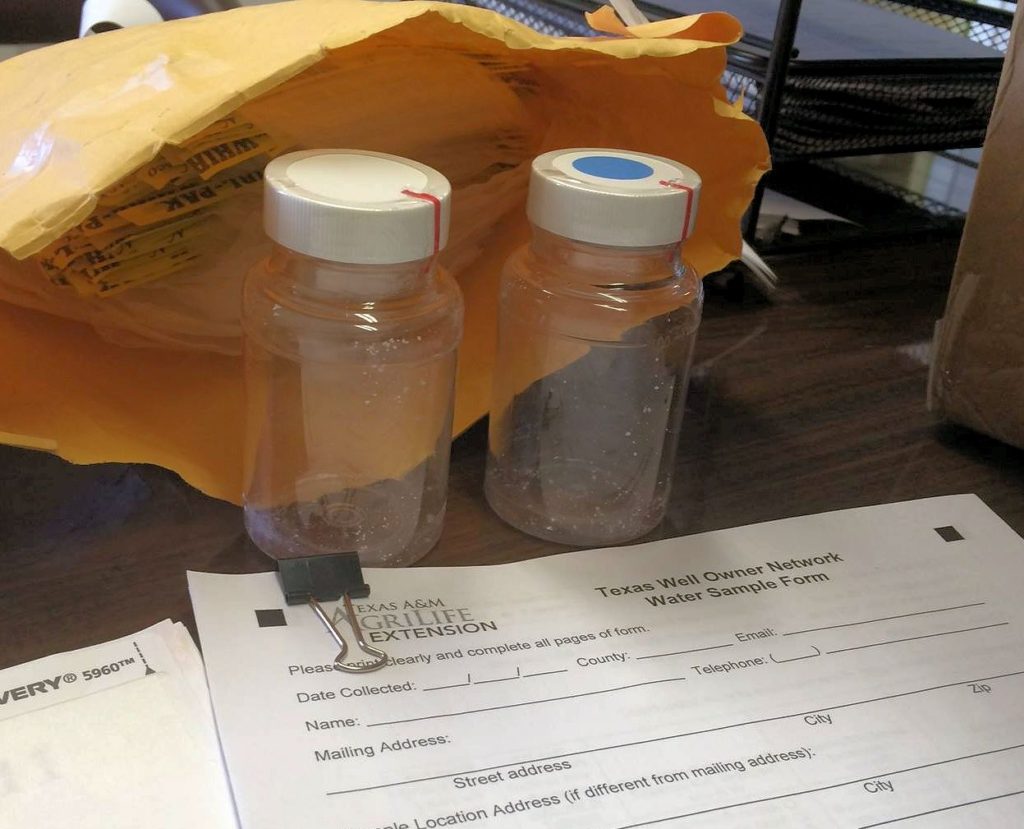Private water well screening set for counties in the Panhandle
Multiple counties involved in meetings Nov. 15 in White Deer; Nov. 16 in Canadian; Nov. 17 in Hereford
The Texas Well Owner Network, TWON, is hosting two “Well Informed” water well screening events on Nov. 15 in White Deer and Nov. 17 in Hereford, and a “Well Educated” event on Nov. 16 in Canadian .
Joel Pigg, Texas A&M AgriLife Extension Service program specialist and TWON coordinator, Bryan-College Station, said the TWON Well Informed program is for Texas residents who depend on household wells for their water needs.
“The Well Educated program was established to help well owners become familiar with Texas groundwater resources, septic system maintenance, well maintenance and construction, and water quality and treatment,” he said. “It allows them to learn more about how to improve and protect their community water resources.”
The screenings are presented by AgriLife Extension and Texas Water Resources Institute, TWRI. The cost is $15 per sample. Area residents wanting to have their well water screened should pick up a sample bag, bottle and instructions from their county AgriLife Extension office.
Water samples that are properly collected and turned in at least one day in advance of the meeting will be screened for contaminants, including total coliform bacteria, E. coli, nitrate-nitrogen and salinity.
Water sampling and meeting information
— White Deer meeting: On Nov. 14, water samples can be dropped off from 8:30-10 a.m. at the offices for Potter County, 3301 S.E. 10th Ave., Building 1, Amarillo; for Armstrong County, in the Courthouse, 100 Trice St., Claude; for Carson County, in the Courthouse, 501 Main St., Panhandle; in Gray County, 12125 E. Frederic Ave., Pampa; and in Donley County, 4430 Highway 70 North, Clarendon. Additionally, they can be dropped at the Panhandle Groundwater Conservation District office, 203 W. 3rd St., White Deer.
On Nov. 15, the follow-up meeting to explain the results of the screenings will be at 4 p.m. at the Panhandle Groundwater Conservation District office – Windmill Room.
— Canadian meeting: On Nov. 15, water samples can be dropped off from 8:30-10 a.m. at the AgriLife Extension offices for Hemphill County, 10965 Exhibition Center Road, Canadian; Roberts County, 112 Waters Street, Miami; or Wheeler County, 7939 U.S. Highway 833, Wheeler, or the Hemphill County UWCD office, 211 N 2nd St.
On Nov. 16, the follow-up meeting will be at 10 a.m. at the Hemphill County Exhibition Center, Sand Sage Room, 10965 Exhibition Road, Canadian.
— Hereford meeting: On Nov. 16, water samples can be dropped off from 8:30-10 a.m. at the AgriLife Extension offices for Deaf Smith County, 903 14th St., Hereford, or Oldham County, 304 Vega Blvd., Vega.
On Nov. 17, the follow-up meeting will be at 6 p.m. at the AgriLife Extension office in Hereford.
Sampling instructions
“It is very important that only sampling bags and bottles from the AgriLife Extension office be used and all instructions for proper sampling are followed to ensure accurate results,” Pigg said.
Private water wells should be tested annually. Samples will be screened for contaminants, including total coliform bacteria, E. coli, nitrate-nitrogen and salinity.
It is extremely important for those submitting samples to be at the follow-up meeting in order to receive results, learn corrective measures for identified problems and improve their understanding of private well management, he said.
Well water contaminants, concerns
Pigg said research shows the presence of E. coli bacteria in water indicates that waste from humans or warm-blooded animals may have contaminated the water. Water contaminated with E. coli is more likely to also have pathogens present that can cause diarrhea, cramps, nausea or other symptoms.
The presence of nitrate-nitrogen in well water is also a concern, and water with nitrate-nitrogen at levels of 10 parts per million is considered unsafe for human consumption, he said.
“These nitrate levels above 10 parts per million can disrupt the ability of blood to carry oxygen throughout the body, resulting in a condition called methemoglobinemia,” Pigg said. “Infants less than 6 months of age and young livestock are most susceptible to this.”
Salinity, as measured by total dissolved solids, will also be determined for each sample. Water with high levels may leave deposits and have a salty taste. Using water with high levels for irrigation may damage soil or plants.
To learn more about the programs offered through the network or to find additional publications and resources, visit http://twon.tamu.edu. For more information, contact one of the participating AgriLife Extension offices.
Funding for the Texas Well Owner Network is through a Clean Water Act nonpoint source grant provided by the Texas State Soil and Water Conservation Board and the U.S. Environmental Protection Agency. The project is managed by TWRI, part of Texas A&M AgriLife Research, AgriLife Extension and the Texas A&M College of Agriculture and Life Sciences.



